Iranians among the dead in Israeli airstrikes on Quds Force base in Syria. Death toll expected to rise, monitor group says.
By David Rosenberg, INN Nov 18 , 2020
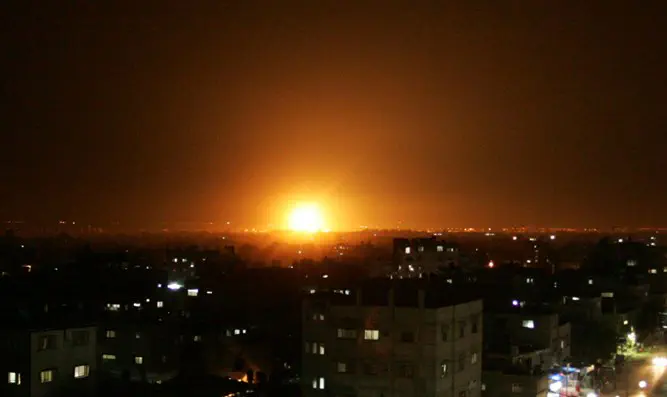
Airstrike (archive)<
>
At least 10 people were killed and more injured in Israeli airstrikes in Syria overnight, a monitor group reported Wednesday morning.
Israeli military aircraft struck Syrian air defense batteries and an army base used by Iran’s Quds Force in Syria late Tuesday night and early Wednesday morning.
According to a report by the London-based Syrian Observatory for Human Rights, the Israeli aircraft bombed a Syrian army air defense center, as well as a regional headquarters for the Quds Force in Syria and supply depots and weapons caches used by pro-Iranian forces.
The targets were struck in Damascus and south of the capital, including in Sayyidah Zaynab and Kiswah.
A total of 10 fatalities were reported, all of them combatants, the SOHR said.
The casualties included three Syrian air defense personnel, five Iranians, and two pro-Iranian fighters whose identity has yet to be confirmed. They are likely either Lebanese or Iraqi nationals, the SOHR report said.
Syria’s state media outlet SANA, confirmed that three soldiers had been killed, and that a fourth was injured.
The SOHR report added that the number of dead is expected to increase, given the large number of injured.
The airstrikes reportedly resulted in “significant material losses” for the Quds Force in Syria.
The IDF Spokesperson’s Unit said the attack was carried out in response to the placement of explosives near the border fence with Syria in Israeli territory, by a Syrian squad operating under Iranian guidance.
IDF says it bombed barracks of top Iranian officers in Syria to ‘send message’
Military says Iranian command base near Damascus airport also among targets hit overnight in response to attempted border attack; army goes on high alert for possible retaliation
Today, 8:01 am<
>
<
>
The Israel Defense Forces said a round of airstrikes it carried out in Syria on Wednesday morning was meant to send a message to Iran to leave the country, specifically the border area, following an attempted attack on the Golan Heights that was thwarted this week.
In the predawn hours of Wednesday morning, Israeli fighter jets struck eight targets in Syria — roughly half near Damascus and half along the Golan border — in response to an Iranian-directed effort to set off anti-personnel mines against Israeli troops, IDF Spokesperson Hidai Zilberman said. The explosives were disarmed on Tuesday morning.
According to the spokesman, the strikes targeted a number of facilities controlled by Iran’s Islamic Revolutionary Guards Corps’ expeditionary Quds Force, which commands and supports proxy militias in Syria. In addition, the Israeli fighter jets bombed a Syrian military base, as well as several Syrian anti-aircraft batteries that fired at them.
The Syrian state news agency SANA said three soldiers were killed and one was injured in the attack, which it said targeted sites in southern Syria. There were no immediate reports of casualties from the IRGC.
The Syrian Observatory for Human Rights, a pro-opposition organization based in the United Kingdom, said 10 people in total were killed in the Israeli strikes, some of them Iranian. This could not be immediately confirmed. The Observatory has in the past been accused of inflating and even inventing casualty figures. In general, Israel does not intentionally target people in its strikes, instead focusing on infrastructure, as this has been found to reduce the likelihood of retaliation by Iran and its proxies.
Zilberman told reporters that the retaliatory attack was intended as both a message to Iran that “we won’t allow Iranian entrenchment at all and next to the border specifically,” and a message to Syria that it will be held responsible for allowing Tehran to maintain a presence in its country.
The spokesman said that Israel tried to send a similar message to Iran and Syria in August after a previous attempt to plant bombs along the border, but it evidently “wasn’t received.”
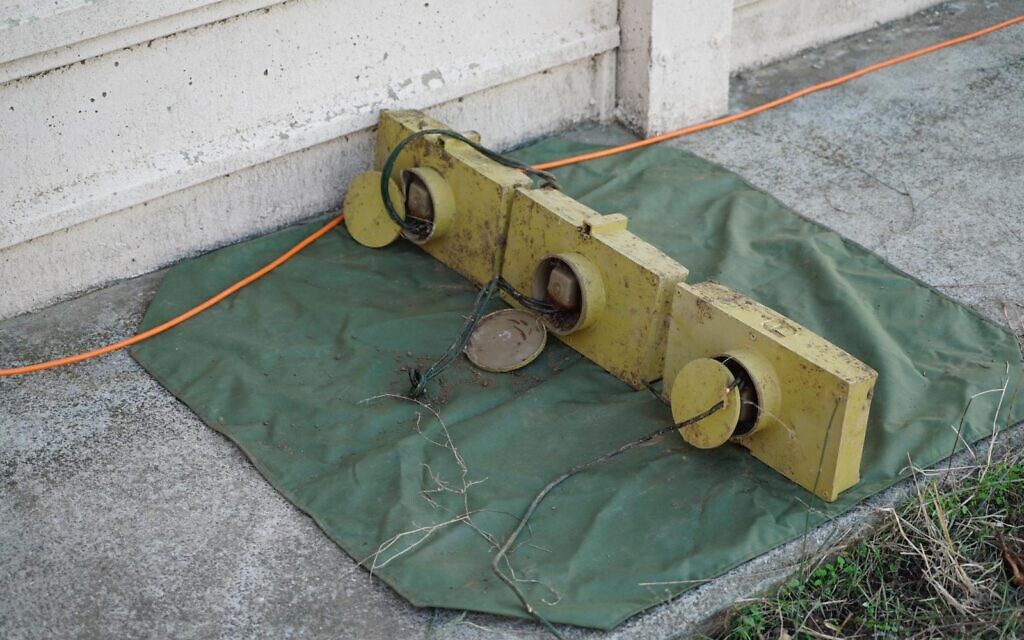
Three anti-personnel mines that Israel says were planted inside Israeli-controlled territory along the border with Syria, which were uncovered on November 17, 2020. (Israel Defense Forces)<
>
<
>
Zilberman said the military was prepared for the possibility of retaliation from Iran or Syria, with Iron Dome and other air defense systems on high alert.
Israel views a permanent Iranian military presence in Syria as an unacceptable threat, which it will take military action to prevent.
Defense Minister Benny Gantz threatened further action if Iran again attempted to carry out attacks on Israeli forces or continued to establish a permanent military presence in Syria.
“The IDF last night struck military targets belonging to the Iranian Quds Force and the Syrian military in response to the planting of bombs on the Syrian border within Israeli territory. I say again to our enemies: Israel will not accept violations of our sovereignty anywhere, and we will not allow a dangerous force build-up on any border,” Gantz said in a Hebrew video statement.
Zilberman did not reveal the nature of all eight targets of the predawn attack, but said they included: a military base used by Iran to direct its forces in the country located just next door to Damascus International Airport; a secret barracks used by top Iranian commanders in Syria, which is also used to host visiting delegations from Tehran, southeast of Damascus; a base of the Syrian military’s 7th Division, which cooperates widely with Iran; and mobile Syrian surface-to-air missile batteries.
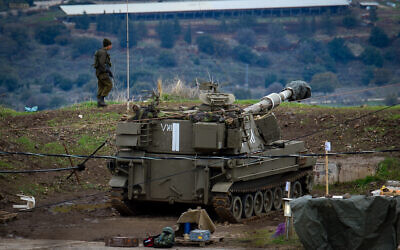
Illustrative: IDF troops near the Israel-Syria border, in the Golan Heights on January 3, 2020. (Basel Awidat/Flash90)<
>
<
>
According to the spokesman, the military knew there were Iranian officers in the barracks when the attack was carried out, but did not specifically target them or the areas in the building where they were located.
In addition, the IDF said it targeted arms warehouses in Syria. Zilberman did not comment on the nature of the sites that were bombed on the Golan border.
The Syrian state news outlet also said Syrian air defenses shot down several incoming Israeli missiles, though war analysts generally dismiss the regime’s regular claims of interceptions as false, empty boasts. Zilberman said the military was still reviewing the results of the attack so he could not say definitively if the claim was true, but that if the Syrian military had succeeded in downing any incoming missiles, it was “extremely marginal if it happened at all.”
Though Israel officially maintains a policy of ambiguity regarding its activities in Syria — in the hopes of not giving Iran and Syria a pretext to respond — the IDF consistently acknowledges carrying out airstrikes on targets in Syria that either are in response to specific attacks from the country, as was the case this week, or were attempts to preempt and prevent such attacks.
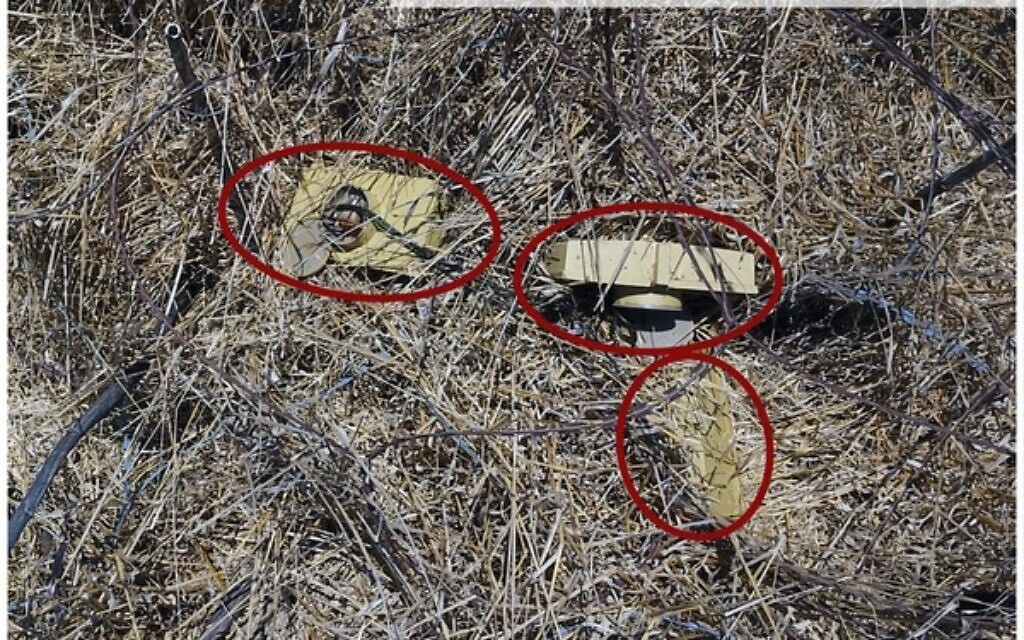
Three anti-personnel mines that Israel says were planted inside Israeli-controlled territory along the border with Syria, which were uncovered on November 17, 2020. (Israel Defense Forces)<
>
<
>
According to Zilberman, the three Claymore-style mines planted along the border were set there by Syrian nationals who live near the border, at the instruction of the IRGC Quds Force. The mines were uncovered in a buffer zone near the border that is under Israeli control but is on the Syrian side of the security fence, where the IDF regularly conducts patrols, indicating that the explosives were meant to be used against soldiers.
It was the same area where Iranian-backed Syrian operatives tried to plant mines in August, though in that case the four men were spotted by the IDF at the time and killed.
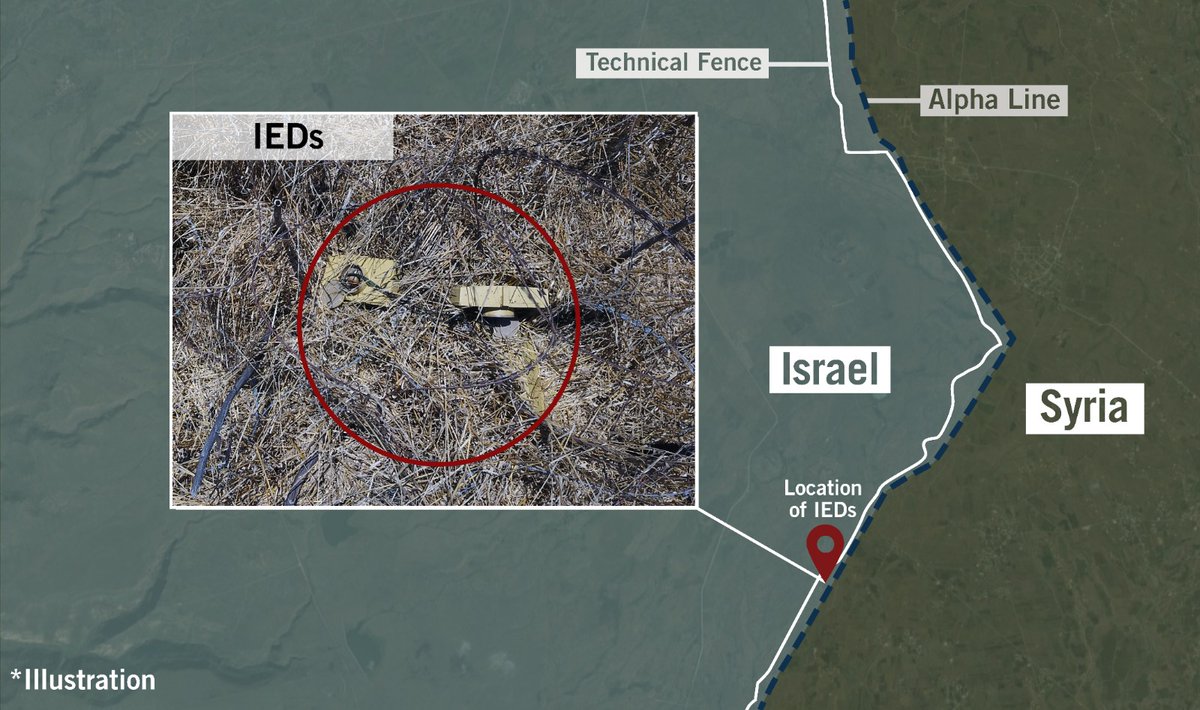
A map showing the approximate location of where Israel says three anti-personnel mines were planted by Syrian nationals working on behalf of Iran, in a buffer zone between the ceasefire line between Israel and Syria and a security fence, on November 17, 2020. (Israel Defense Forces)<
>
<
>
Since that attempt, the IDF has more closely monitored the area to prevent a similar attack.
Zilberman said the military did not yet know when the three mines were planted along the border, but that it seemed to have been several weeks ago. The IDF was investigating how the Iranian-backed operatives were able to evade detection and plant the bombs.
On Tuesday morning, the IDF sent a team of combat engineers into the area to disarm the mines.
The IDF has launched hundreds of strikes in Syria since the start of the civil war in 2011 against moves by Iran to establish a permanent military presence in the country and efforts to transport advanced, game-changing weapons to terrorist groups in the region, principally Hezbollah.
<
>



Israel is taking care of business before the fraud Bejing biden illegally occupies the White House.
65 days and counting…